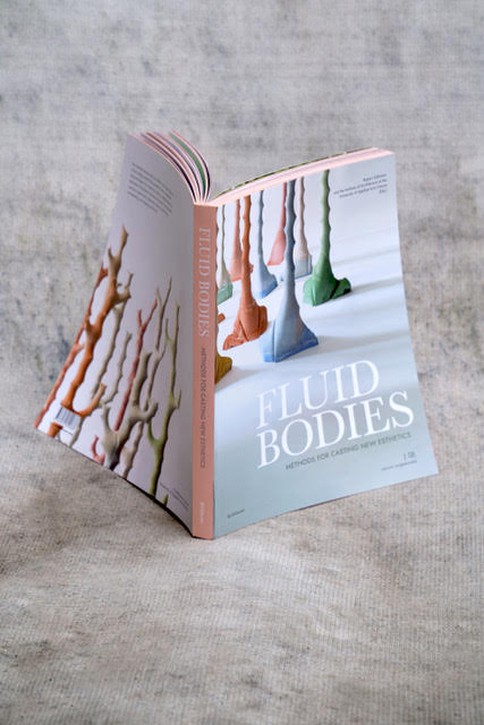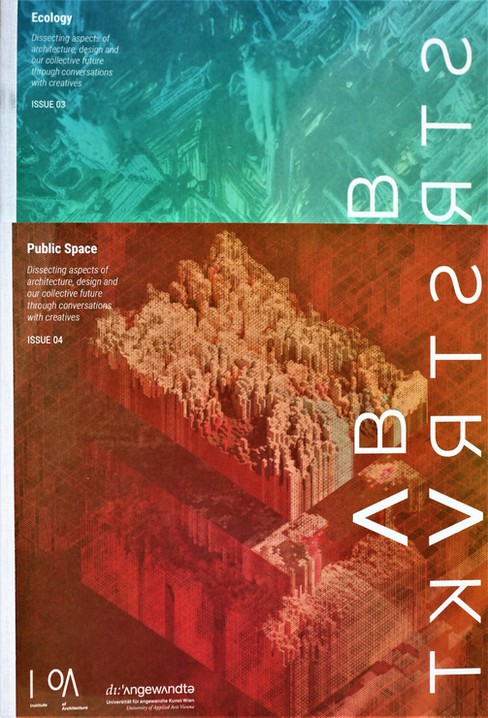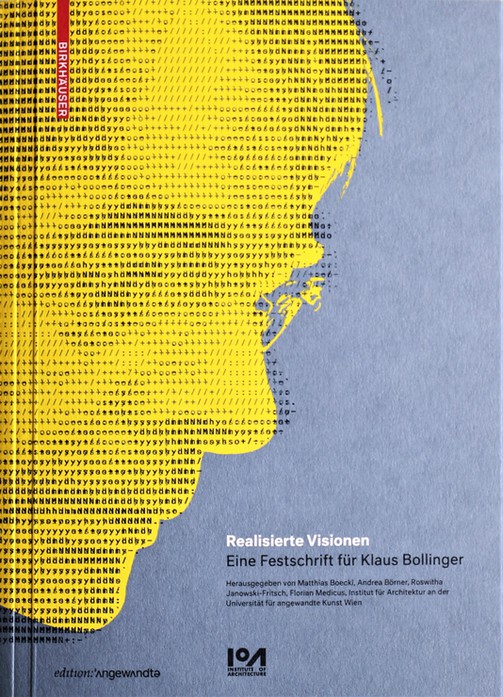Latest news

3 February 2023
Fluid Bodies_Methods for Casting New Esthetics
Edited by Rupert Zallmann and the Institute of Architecture at the University of Applied Arts Vienna (Eds.)
12 January 2023
OPEN CALL for Biennale College Architettura at La Biennale di Venezia

25 August 2022
Abstrakt I
Issue 01 - Health and Architecture Edited by Jade Bailey, Adriana Boeck, Emma Sanson, Patricia Tibu – Students of the Institute of Architecture Issue 02 - Automation, Fabrication and Design Edited by Lisa-Marie Androsch, Jade Bailey, Zach Beale, Adriana Böck, Velina Iantcheva, Xavier Madden, Emma Sanson, Patricia Tibu – Students of the Institute of Architecture “Abstrakt" is a newly established platform for architectural pedagogy at IoA that evolved from Studio Hani Rashid. “Abstrakt“ is the exploration of thoughts and ideas through conversations with creatives inside and outside the university, mixed with a collection of recent works from our students. The launch of our first printed edition during the festival allows us to showcase projects and encourage discussion not only to bridge the three studios and strengthen interaction, but also to share the institute’s efforts with the whole Angewandte.

25 August 2022
Abstrakt II
Issue 03 - Ecologies Edited by Jade Bailey, Adriana Boeck, Emma Sanson, Patricia Tibu – Students of the Institute of Architecture Issue 04 - Public Spaces Edited by Lisa-Marie Androsch, Jade Bailey, Zach Beale, Adriana Böck, Velina Iantcheva, Xavier Madden, Emma Sanson, Patricia Tibu – Students of the Institute of Architecture ABSTRAKT, the students architectural platform and magazine of the I oA, is dedicated to exploring thoughts and ideas through conversations with creatives inside and outside the university, juxtaposing them with recent works by our students to reflect the visions of this architecture school. The launch of our second printed edition during the Festival allows us to showcase projects and encourage discussion not only to foster interaction between the three studios, but also to share the Institute’s efforts with the entire Angewandte community.

25 August 2022
Co-Corporeality of Humans, Machines, & Microbes
On architecture, AI, and microbiology The theory of Co-Corporeality is based on a conception of the built environment as a biological entity that opens up a space for coexistence and interaction between humans and microbial life. Based on design-led research, this book explores how we can develop environments for a multispecies world. It focuses on the agency of both human and nonhuman actors. New sensor tools enable observation of and interaction between these different actors. Co-Corporeality links microbiology to material science, artificial intelligence, and architecture. The focus is on how microbial activity can create new protoarchitectural materials, how living systems can be integrated into architecture and cooperate along different time scales. How artistic interventions connect human and nonhuman worlds through tracking systems and machine learning algorithms With essays by Rachel Armstrong, Alex Arteaga, Philip Beesley, Jens Hauser, and others Images of experiments and installations Edited by Barbara Imhof, Daniela Mitterberger and Tiziano Derme

25 August 2022
Conceptual Joining - Wood Structures from Detail to Utopia/Wood Structures in Experimentation
With further contributions by:Gerald Bast, Brigitte Felderer, Hélène Frichot, Moritz Heimrath, Philipp Hornung, Anja Jonkhans, Helga Lichtenegger, Ferdinand Ludwig, Ulrich Müller, Adam Orlinski, Hannelore Paflik-Huber, Clemens Preisinger, Karin Raith, Jun Sato, Karolin Schmidbaur, Alfred Teischinger, Klaus Zwerger. In the artistic research project Conceptual Joining, the essence of wood as a building material is investigated as a determining principle for an architecture. The logic of complex material properties and the intelligence of classical joining techniques are translated into experimental spatial structures with the help of digital tools. The documentation of the work processes is complemented by selected guest contributions. Edited by Lukas Allner, Christoph Kaltenbrunner, Daniela Kröhnert, Philipp Reinsberg, Institute for Architecture and Institute for Art Sciences, Art Education and Art Mediation, University of Applied Arts Vienna
25 August 2022
forA on the Urban
forA is a project rendered possible by Die Angewandte (University of Applied Arts Vienna), conceptualized and produced by the Institute of Architecture (I oA), edited by Gerald Bast (Rector, University of Applied Arts Vienna), Andrea Börner (Urban Strategies Department, I oA), Cristina Díaz Moreno & Efrén García Grinda (Architectural Design Studio 1, I oA), and Baerbel Mueller (Applied Foreign Affairs Lab, I oA), supported by an international advisory board: Tom Avermaete, Margitta Buchert, Nerea Calvillo, Mario Carpo, Filip de Boeck, Keller Easterling, Teresa Galí-Izard, Mario Gandelsonas, Andrew Herscher, Sandi Hilal, Nikolaus Hirsch, Sanford Kwinter, Lesley Lokko, Mpho Matsipa, John McMorrough, Peter Mörtenböck, Helge Mooshammer, Alesandro Petti, Philippe Rekacewicz, Curtis Roth, Saskia Sassen, Abdoumaliq Simone, Ines Weizman, Liam Young. The first issue #0 aims to initiate the cyclical nature of the project in this initial phase by fostering a process of invited and openly addressed contributions reflected on a discursive online platform, compiled in a pilot issue of the journal, and was debated at the launching event in September during the 17th International Architecture Biennale in Venice. With regard to the openly declared interests in emerging topicalities and formats, the aim is to intentionally conflate contributions that address spatial entanglements, dialogues and processes and methods of articulations, without framing any particular subject or topic. Issue #0 rather aims to open up the field to provide rich material and thought for further exploration in subsequent issues. Edited by Gerald Bast, Andrea Börner, Cristina Díaz Moreno & Efrén García Grinda and Baerbel Mueller

25 August 2022
Nonlinear Urbanism Towards Multiple Urban Futures
This book compiles speculative contributions on disruptive, nonlinear futures of urban agglomerations, based on research conducted on urban innovation at the Department of Special Topics in Architecture at the Institute of Architecture of the University of Applied Arts Vienna. Students, alongside renowned experts, also comment on questions concerning our urban future.The novel reading structure, which is realized and suggested by the concept of the book, is also nonlinear: thematic, graphic cross-references enable contextual reading in addition to continuous reading. The enhancement of the printed book with digital augmented reality (AR) components offers networked, simultaneous reading on several levels and thus reflects the complexity of urban systems. Edited by Anton Falkeis, Anastasia Shesterikova, Benjamin James, Michael Tingen and the Institute of Architecture at the University of Applied Arts Vienna

25 August 2022
Realisierte Visionen - Eine Festschrift für Klaus Bollinger
Klaus Bollinger: An appraisal This commemorative publication is dedicated to the visionary structural engineer and Professor for Structural Engineering at the Institute of Architecture (I oA) at the University of Applied Arts Vienna, Klaus Bollinger. On the occasion of his retirement, colleagues from teaching and practice, renowned architects, and graduates of the IoA pay tribute to Klaus Bollinger’s work in around 100 contributions. He is honored as a committed professor and longstanding dean, as an internationally regarded engineer, and also as a friend. Not only in his successful collaboration with Manfred Grohmann (Bollinger + Grohmann currently have offices at thirteen locations worldwide), but also as a teacher and dean, Klaus Bollinger played a significant role in shaping innovative and contemporary planning and architecture worldwide. Edited by Matthias Boeckl, Andrea Börner, Roswitha Janowski-Fritsch, Florian Medicus and Institute of Architecture at the University of Applied Arts Vienna

28 September 2020
Positions - Unfolding Architectural Endeavors
Over the last ten years, the SLIVER series of lectures has gained international recognition as a forum where young and established designers, artists, and theorists can present and exchange new ideas. In the context of the 150-year anniversary of the University for Applied Arts, SLIVER presented as "positions" the works and ideas of graduates from the Institute for Architecture created in the course of the last three decades. Edited by Maja Ozvaldič, Bence Pap, Indre Umbrasaitė, and the Institute of Architecture (Eds.)

28 September 2020
Stressing Wachsmann. Structures for a Future/Strukturen für eine Zukunft
Stressing Wachsmann – Structures for a Future offers a comprehensive overview of German-American architect Konrad Wachsmann’s life (1901-1980), work and influence. Wachsmann’s multifarious pioneering achievements and his unconditional faith in future technologies and methods testify to his profound humanism. Klaus Bollinger, Florian Medicus and the Akademie der Künste, Berlin (Eds.)

28 September 2020
Studio Kazuyo Sejima ISLAND, CITY, VILLAGE, RIVER
ISLAND, CITY, VILLAGE, RIVER is a visual archive of the selected projects developed over a four-year period at the Studio Kazuyo Sejima, Institute of Architecture, University of Applied Arts in Vienna. Kazuyo Sejima, co-founder of SANAA, the Tokyo-based Pritzker Prize winning practice, was head of the studio between 2015 and 2019. Edited by Anna Gulińska and Indrė Umbrasaitė, Studio Sejima and the Institute of Architecture, University of Applied Arts Vienna